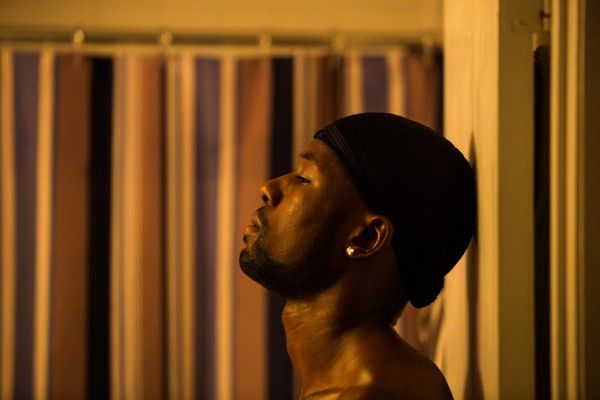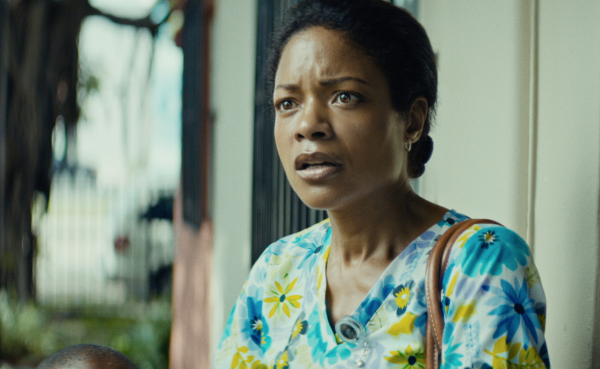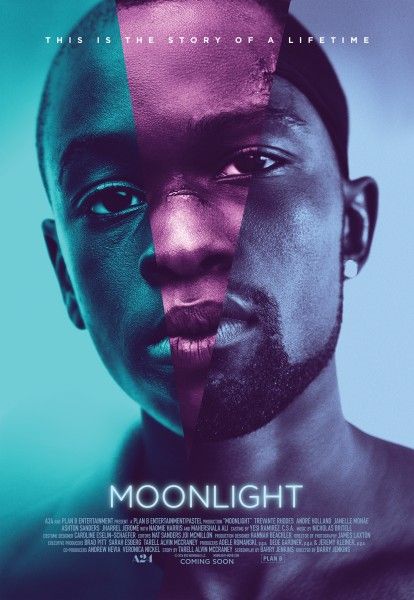[NOTE: This is a repost of my review from The Telluride Film Festival; Moonlight has been in limited release; but with the film expanding nationwide today, November 18, we are re-posting the review.]
Moonlight is a small but special film. It's delicate and entirely necessary. It follows two young boys who grow up together in a drug-riddled black neighborhood in Miami. One is able to hide his open sexuality by flexing hetero-confidence and the other is routinely picked on, hangs his head low, and bounces between his drug addict mother's home and the local dealer who provides him a safe and understanding house whenever needed. And while the children show immense talent in wrestling with larger issues and extremely complex moments, the adult cast of Moonlight does some astounding and important work.
Our vantage point is from the picked-on boy. He goes by three names in the film. The first is Little (Alex Hibbert) because that's what the boys call him. In this stage, he's 9. We meet him again at age 16 and he's going by his given name, Chiron (Ashton Sanders). And the film closes with him more than a decade later, going by Black (Trevante Rhodes) because that's the nickname that was given to him by the schoolmate who first taught him how to defend himself (at age 9) and made a sexual advance on the beach (at age 16). The name changes are important to the film (beyond being used as chapter titles) because each name is given by someone who has given him immense pain (his mother, taunting school boys, and the boy who touched him, but also broke his young heart). Still, Chiron chooses to identify with the one given to him by Kevin.
In smaller roles, but very important, Kevin is also played by three actors (Jaden Piner at 9, Jharrel Jerome at 16 and Andre Holland a decade later). Kevin is presented as an extremely sexual being. At 9, he compares penises with other boys (Little walks in on them). At 16, he brags about having sex in the hallway with a girl and on the beach he also makes the move to not only kiss but also unbuckle Chiron's pants. When he's older, it's difficult to discern where his tenderness for Chiron lies, whether it's physically romantic or romantically nostalgic.
Barry Jenkins' film is very intimate, less sexually, and more in observations. Since both the boys and the adult men exist in a hardened world full of pushers and addicts and anything perceived as "different" receives physical punishment, there is immense focus on the actor's eyes and lips. These gentle movements convey an openness to friendship or a desire to express more outward openness in intimacy. In his late 20s, Black is a physically imposing character. No longer the skinny and lengthy boy with his head down, he's mountainously muscled, wears gold grills and looks imposing but still carries a warm center and soft approach to others.
Rhodes, though he says the least, perhaps has the hardest role in Moonlight. For his physicality shows immense strength but his internal desire for Kevin is almost only communicated through gestures with his eyes and body, which he also presents as a barrier for what his heart wants. And his performance is tone perfect.
Mahershala Ali is magnificent as Juan, the neighborhood kingpin who also has a softness, and rescues Little from a walled-up trap house that the schoolboys had chased him into, throwing bottles at him. Juan is patient in retrieving information from the boy, offers him food, drives him around and ultimately takes him home where his girlfriend, Teresa, (Janelle Monae) offers him a bed for the night. Little continues to run away to their home, but Juan becomes conflicted when he realizes that his corner boys are selling crack to Little's mother (a superb Naomie Harris), and though he provides respite for the child, he's also wrecking his home life and forcing him to run away because of his mother's addiction.
This circular narrative of the neighborhood in Miami (and later Atlanta)—dealers and addicts—is of equal importance to the gay storyline. Yes, Moonlight is important for its message of not just acceptance of homosexuality within black communities, but also an embracing of boys who exist outside of that hardened world, and how masculinity has many different expressions, sexually and otherwise. But Jenkins' script casually drops many lines about a character's time in juvenile detention or jail—or even a funeral—to show how constant incarceration is in their community. "When I was in jail" is said as casually as "when I was in middle school" like it's just a natural progression of growing up. This is not something that is hammered home but it's an important and sad portrait that runs parallel to our race conversations today of the over-imprisonment of black Americans and a lack of inroads to leave communities through better opportunities.
Messages aside, Moonlight is achingly rendered by Jenkins. There's warmth and tension in every frame, mostly from characters trying to find the right words or motions to express themselves. But Moonlight is more personal etched than it is masterful. The chapter narrative works by and large, but the film does suffer a little from the lack of Ali's presence after the first chapter. And although beautifully performed, a genuine moment of surprise doesn't happen until perhaps the final shot (again, the expression of characters convey many layered meanings of things potentially going unsaid). But Moonlight is so handsomely constructed, with magnificent musical cues and performances that it pushes into a "completely necessary" filmmaking category.
Grade: A-
Moonlight will be released in select theaters on October 21; nationwide November 18.




